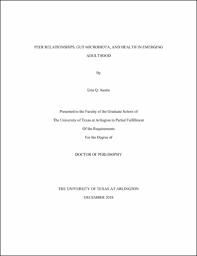
ATTENTION: The works hosted here are being migrated to a new repository that will consolidate resources, improve discoverability, and better show UTA's research impact on the global community. We will update authors as the migration progresses. Please see MavMatrix for more information.
Show simple item record
| dc.contributor.advisor | Jensen-Campbell, Lauri A. | |
| dc.creator | Austin, Erin Quinn | |
| dc.date.accessioned | 2020-01-14T22:06:23Z | |
| dc.date.available | 2020-01-14T22:06:23Z | |
| dc.date.created | 2018-12 | |
| dc.date.issued | 2018-12-03 | |
| dc.date.submitted | December 2018 | |
| dc.identifier.uri | http://hdl.handle.net/10106/28886 | |
| dc.description.abstract | Research has consistently shown that chronic stress has negative effects on overall physical and psychological wellbeing across the lifespan. The biological mechanisms through which stress exerts its effects on the body and the mind includes the recently discovered microbiome-gut-brain axis, the bidirectional communication between the brain and the enteric nervous system that is modulated by the microorganisms residing within the gastrointestinal tract. This dissertation examined the impact chronic psychosocial stress (e.g., peer victimization, daily hassles) had on gut diversity and the relative abundance specific bacterial groups in a diverse sample of emerging adults (N = 126, Mean age = 20.07). Relationship between the gut microbiome, peer victimization, physical health including biological markers of inflammation (e.g., interleukin-6, C-reactive protein), and psychological symptoms (i.e., internalizing problems, depression, anxiety) were also evaluated. During two lab visits, participants completed self-report measures concerning peer victimization and physical and psychological health. Participants collected an at-home fecal sample between lab visits. 16S microbiome sequencing was performed on an Illumina MiSeq. Alpha and Beta diversity metrics were calculated and OTU tables were generated. Participant’s blood was collected via antecubital venipuncture by a trained phlebotomist and ELISA assays were used to analyze IL-6 and CRP. Results showed that when peer victimization was treated as a continuous variable, it did not predict differences in alpha diversity (e.g., absolute OTU counts, Chao1 estimator, Shannon Index) and was not associated with differences at the phylum or genus level for taxa associated with stress. Gut diversity was found to moderate the relationships between peer victimization and psychological health (i.e. internalizing problems, depression, anxiety), but not physical health. Beta diversity analyses revealed group differences between victims and non-victims driven by shifts in the relative abundance of taxa associated with social stress, depression, and anxiety. These findings highlight the importance of the microbiome-gut-brain axis within the relationship between peer victimization and poor health outcomes and represent a novel target for intervention to help alleviate the negative effects of psychosocial stress. | |
| dc.format.mimetype | application/pdf | |
| dc.language.iso | en_US | |
| dc.subject | Peer victimization | |
| dc.subject | Gut microbiota | |
| dc.subject | Stress | |
| dc.subject | Health | |
| dc.subject | Depression | |
| dc.subject | Anxiety | |
| dc.subject | Inflammation | |
| dc.title | PEER RELATIONSHIPS, GUT MICROBIOTA, AND HEALTH IN EMERGING ADULTHOOD | |
| dc.type | Thesis | |
| dc.degree.department | Psychology | |
| dc.degree.name | Doctor of Philosophy in Psychology | |
| dc.date.updated | 2020-01-14T22:06:24Z | |
| thesis.degree.department | Psychology | |
| thesis.degree.grantor | The University of Texas at Arlington | |
| thesis.degree.level | Doctoral | |
| thesis.degree.name | Doctor of Philosophy in Psychology | |
| dc.type.material | text | |
| dc.creator.orcid | 0000-0003-1110-1029 | |
Files in this item
- Name:
- AUSTIN-DISSERTATION-2018.pdf
- Size:
- 2.591Mb
- Format:
- PDF
This item appears in the following Collection(s)
Show simple item record


